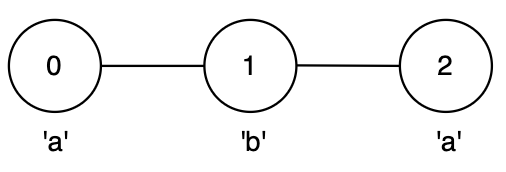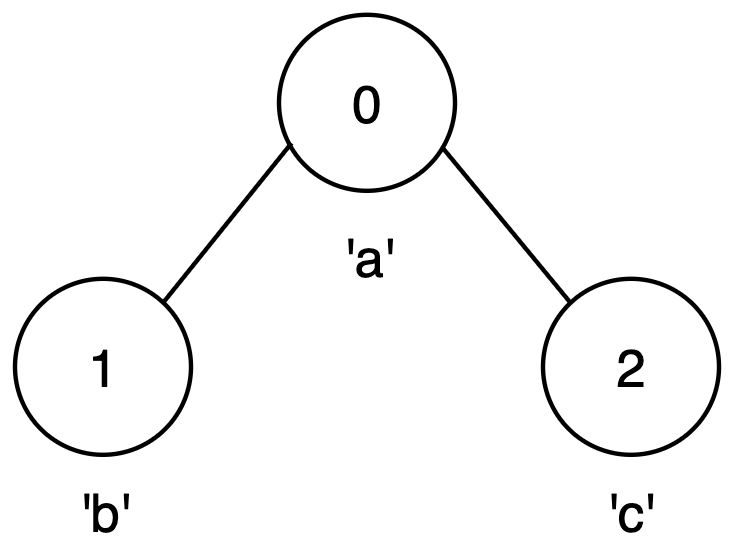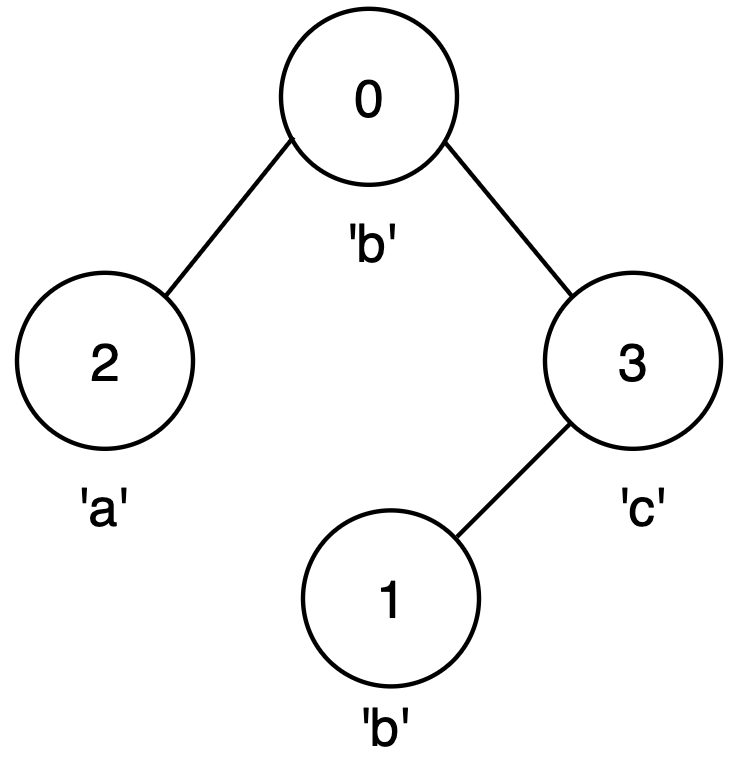LeetCode in Kotlin
3615. Longest Palindromic Path in Graph
Hard
You are given an integer n and an undirected graph with n nodes labeled from 0 to n - 1 and a 2D array edges, where edges[i] = [ui, vi] indicates an edge between nodes ui and vi.
You are also given a string label of length n, where label[i] is the character associated with node i.
You may start at any node and move to any adjacent node, visiting each node at most once.
Return the maximum possible length of a palindrome that can be formed by visiting a set of unique nodes along a valid path.
Example 1:
Input: n = 3, edges = [[0,1],[1,2]], label = “aba”
Output: 3
Explanation:

- The longest palindromic path is from node 0 to node 2 via node 1, following the path
0 → 1 → 2forming string"aba". - This is a valid palindrome of length 3.
Example 2:
Input: n = 3, edges = [[0,1],[0,2]], label = “abc”
Output: 1
Explanation:

- No path with more than one node forms a palindrome.
- The best option is any single node, giving a palindrome of length 1.
Example 3:
Input: n = 4, edges = [[0,2],[0,3],[3,1]], label = “bbac”
Output: 3
Explanation:

- The longest palindromic path is from node 0 to node 1, following the path
0 → 3 → 1, forming string"bcb". - This is a valid palindrome of length 3.
Constraints:
1 <= n <= 14n - 1 <= edges.length <= n * (n - 1) / 2edges[i] == [ui, vi]0 <= ui, vi <= n - 1ui != vilabel.length == nlabelconsists of lowercase English letters.- There are no duplicate edges.
Solution
import kotlin.math.max
class Solution {
fun maxLen(n: Int, edges: Array<IntArray>, labelsStr: String): Int {
val labels = labelsStr.toCharArray()
// collect lists of adjacent nodes
val adj = adj(n, edges)
// size of int to store n bits bitmask
val bSize = 1 shl n
val cache = Array<Array<IntArray>>(n) { Array<IntArray>(n) { IntArray(bSize) } }
var maxLength = 0
for (i in 0..<n) {
// find palindromes of odd length (one node in the middle)
val localLength = findPalindrome(adj, labels, i, i, 0, cache)
maxLength = max(maxLength, localLength)
// find palindromes of even length (two nodes in the middle)
for (j in adj[i]) {
if (labels[i] == labels[j]) {
val length = findPalindrome(adj, labels, i, j, 0, cache)
maxLength = max(maxLength, length)
}
}
}
return maxLength
}
private fun findPalindrome(
adj: Array<IntArray>,
labels: CharArray,
i: Int,
j: Int,
b: Int,
cache: Array<Array<IntArray>>,
): Int {
if (cache[i][j][b] != 0) {
return cache[i][j][b]
}
var b1 = set(b, i)
b1 = set(b1, j)
val length = if (i == j) 1 else 2
var maxExtraLength = 0
for (i1 in adj[i]) {
if (get(b1, i1)) {
continue
}
for (j1 in adj[j]) {
if (i1 == j1) {
continue
}
if (labels[i1] != labels[j1]) {
continue
}
if (get(b1, j1)) {
continue
}
val extraLength = findPalindrome(adj, labels, i1, j1, b1, cache)
maxExtraLength = max(maxExtraLength, extraLength)
}
}
cache[i][j][b] = length + maxExtraLength
return length + maxExtraLength
}
private fun get(b: Int, i: Int): Boolean {
return (b and (1 shl i)) != 0
}
private fun set(b: Int, i: Int): Int {
return b or (1 shl i)
}
private fun adj(n: Int, edges: Array<IntArray>): Array<IntArray> {
val adjList: MutableList<MutableList<Int>> = ArrayList<MutableList<Int>>()
for (i in 0..<n) {
adjList.add(ArrayList<Int>())
}
for (edge in edges) {
adjList[edge[0]].add(edge[1])
adjList[edge[1]].add(edge[0])
}
val adj = Array<IntArray>(n) { i -> adjList[i].stream().mapToInt { j: Int -> j }.toArray() }
return adj
}
}

